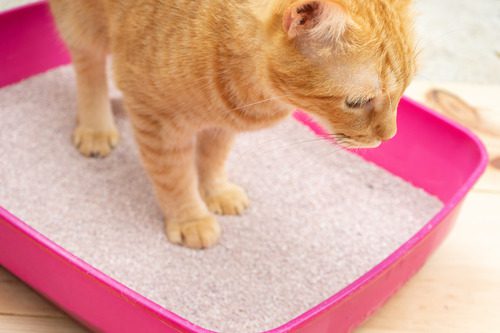My Cat is Straining to Pee. What Do I Do?
Our feline friends are masters at hiding when they are sick or injured, making it difficult for pet owners to discern when something is wrong. One more noticeable issue is when a cat is straining to pee. This symptom can indicate several potential health problems, including emergencies that require immediate veterinary attention.
If your cat is straining to pee, call us immediately and "press 1" to speak with our urgent care department so that we can assess if you need to bring your kitty in right away.
At Ann Arbor Animal Hospital, our team is equipped to determine a diagnosis and create an individual treatment plan to meet your cat’s needs. If you’re concerned about your cat’s health, please call us at (734) 662-4474.

Why Is My Cat Straining to Pee?
When you notice your cat straining to pee, it can be a sign of a urinary issue that needs urgent attention. This behavior might be due to a urinary tract infection (UTI), bladder stones, or even a more severe condition like a blockage. Several underlying issues can cause your cat to strain while trying to urinate:
- Urinary Tract Infection (UTI): A UTI can make urination painful and difficult for your cat. Bacteria can enter the urinary tract, leading to infection and inflammation.
- Bladder Stones: These mineral formations can obstruct the flow of urine, causing your cat to strain. Bladder stones can develop due to various dietary and genetic factors.
- Urethral Obstruction: This is an emergency condition where the urethra becomes blocked, often by crystals or stones, making it almost impossible for the cat to urinate. If not treated promptly, your cat can die from this. It is more common in male cats due to their narrower urethras.
- Feline Idiopathic Cystitis (FIC): FIC is a stress-related condition causing inflammation of the bladder, leading to pain and difficulty urinating.
- Tumors: Although less common, tumors in the bladder or urethra can cause straining during urination.
Potential Symptoms to Watch For
Besides straining to pee, watch for the following signs:
- Frequent trips to the litter box
- Crying out in pain when they are unable to urinate
- Blood in urine
- Licking the genital area
- Becoming more irritable or lethargic due to the discomfort
What to Do Next
Reach out to our team at Ann Arbor Animal Hospital at (734) 662-4474 for guidance and to arrange an emergency visit if necessary. Be ready to describe your cat's symptoms, including any changes in behavior, frequency of urination attempts, and any other noticeable signs. Follow any instructions given by your veterinarian over the phone and prepare to bring your cat in for a physical examination.
What to Expect at the Vet
During your visit, your veterinarian at Ann Arbor Animal Hospital will likely conduct several diagnostic tests to determine the cause of your cat's straining. These may include a urinalysis to identify infections, crystals or blood in the urine. Bloodwork can also reveal any underlying conditions affecting the urinary system. Your vet may perform additional diagnostics such as X-rays or an ultrasound to help visualize stones, tumors, or other abnormalities in the urinary tract and use these results to develop an appropriate treatment plan to relieve your cat's symptoms and address the underlying issue.
Long-Term Management and Prevention
After addressing the immediate issue, your vet may implement long-term management and preventive measures to avoid recurrence of any issues.
- Prescription Diets: Your veterinarian may recommend a special diet designed to prevent the formation of crystals and stones.
- Increase Water Intake: Encourage your cat to drink more water by providing fresh water sources and possibly investing in a cat water fountain.
- Environmental Enrichment: Providing a stimulating environment with plenty of toys and activities can help reduce stress levels in your cat.
- Consistency: Maintain a consistent routine to minimize stress, which can contribute to urinary issues.
- Schedule Routine Exams: Regular veterinary visits can help monitor your cat’s urinary health and catch any potential issues early.
- Follow-Up Tests: Periodic urinalysis and blood tests can ensure your cat’s condition is managed effectively treatment is adjusted as needed.
If you notice any signs of urinary distress in your cat, contact Ann Arbor Animal Hospital at (734) 662-4474 for guidance. Our team is here to provide the necessary care your cat deserves.
Recent Posts
About Us
Ann Arbor Animal Hospital is a locally-owned animal hospital operating for over 90 years in Ann Arbor, MI.
